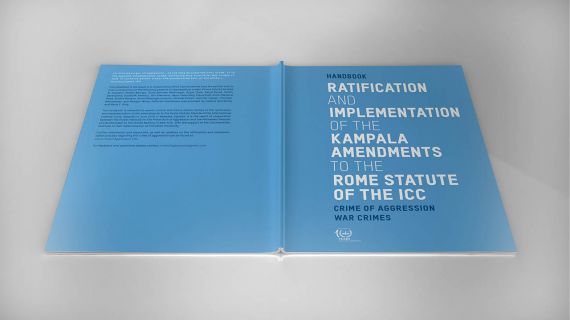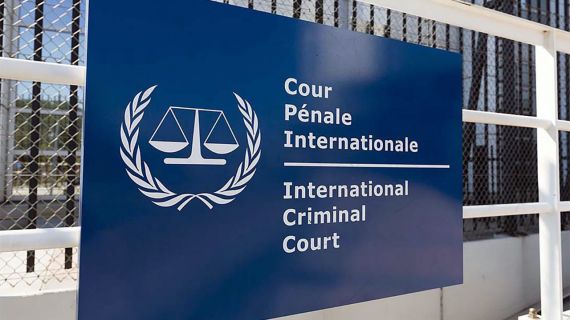Kampala Amendments
What are the Kampala Amendments?
States Parties to the Rome Statute met from 31 May 2010 until 11 June 2010 in Kampala, Uganda, for the 1st Review of the Rome Statute of the ICC, mandated to be convened 9 years after the entry into force of the Statute.
The Review Conference adopted, by consensus, 2 resolutions that amended the crimes under the jurisdiction of the Court:
- Resolution 5, which amended Article 8 of the Rome Statute on war crimes.
- Resolution 6, which followed the instructions in Article 5(2) of the Rome Statute to provide a definition and a procedure for the jurisdiction of the Court over the crime of aggression.
Both amendments have been adopted in the Statute. However, the amendments may enter into force for each ratifying State one year after the deposit of the instrument of ratification (Article 121(5) of the Rome Statute).
To date, 40 and 41 States have ratified the Kampala Amendments to the Rome Statute on war crimes and on the crime of aggression, respectively.
The designated date for activation of the ICC jurisdiction on aggression coincided with the 20th anniversary of the adoption of the Rome Statute, on 17 July 2018.
Jurisdiction of the ICC over the crime of aggression
The Kampala Amendments to the Rome Statute on the crime of aggression encompass a more restricted jurisdictional regime, according to which the ICC has:
Automatic jurisdiction when the alleged crimes are committed:
-
Within the territory of a State Party (territorial jurisdiction) and
-
By nationals of a State Party (active personality jurisdiction),
-
Unless any of the States involved previously declared that it does not accept the ICC jurisdiction by lodging a declaration with the Registrar (opt-out) (Art. 15bis 4 Rome Statute)
And ad-hoc jurisdiction when:
-
A situation is referred by the United Nations Security Council (Art. 15 ter Rome Statute), regardless of the location or the criminal conduct and nationality of the alleged perpetrator.
No jurisdiction over States not Parties:
With the only exception in case of a referral by the UN Security Council, the ICC may not exercise jurisdiction regarding States not Parties to the Rome Statute, i.e. whenever a crime of aggression is committed by a national of a State not Party or on its territory. This clause is to be interpreted as a departure from Art. 12(3) which allows States not Parties to accept the ad-hoc jurisdiction of the Court.
Why are the Kampala Amendments important?
The decision of States to bring back to unity the corpus juris of International Criminal Law and call for universal ratification of the amendments will give effect to the principle “Never again” for aggressive wars and protect the victims of armed conflicts who are not protected by the norms on genocide, crimes against humanity, and war crimes as enshrined in the Rome Statute.
Achievements
PGA facilitated parliamentary involvement in the Kampala Review Conference through sample parliamentary questions, which were in fact used around the world, including by the European Parliament.
Moreover, PGA organized several high-level events and strategic meetings to strengthen the framework of the prohibition of the illegal use of force under the UN Charter, including:
- On 19 October 2016, PGA members in the Dominican Republic meet with the Minister of Foreign Affairs to discuss the Ratification of the Kampala Amendments.
- 7th CAP-ICC on 11 December 2012 in Rome, Italy: 200 members of Parliament from 50 countries from all regions of the world adopted the Rome Plan of Action through which they resolved to ensure the ratification of the Kampala Amendments by their countries and to achieve 30 ratifications before 2016. This goal was achieved in 2016 by the ratifications of Palestine and/or The Netherlands.
PGA also contributed to the ratification of the Kampala Amendments in 7 countries:
- Bolivia December 2020.
- Ecuador on 23 April 2019.
- Paraguay on 12 December 2018.
- Honduras on 19 April 2017.
- Argentina on 3 November 2016.
- Chile and the Netherlands on 23 September 2016.
Amendments To The Rome Statute Adopted After Kampala 2010
Which are the amendments to the Rome Statute adopted after Kampala 2010?
After the Review Conference of the Rome Statute in Kampala, Uganda, in 2010, additional amendments to the Rome Statute of the ICC have been adopted, including:
- Amendment to Article 124 (2015): The amendment deleted Article 124 from the Rome Statute, a transitional provision allowing a State, upon becoming Party to the Statute, to declare that it does not accept the jurisdiction of the Court over war crimes committed in its territory or by its nationals for a period of seven years.
- Amendment to Article 8 [biological weapons] (2017): The amendment inserted an article defining as a war crime the use of weapons which use microbial or other biological agents, or toxins, whatever their origin or method of production.
- Amendment to Article 8 [blinding laser weapons] (2017): The amendment inserted an article defining as a war crime the use of weapons specifically designed, as their sole combat function or as one of their combat functions, to cause permanent blindness to unenhanced vision, that is to the naked eye or to the eye with corrective eyesight devices.
- Amendment to Article 8 [non-detectable fragments] (2017): The amendment inserted an article defining as a war crime the use of weapons whose primary effect is to injure by fragments which in the human body escape detection by X-rays.
- Amendment to Article 8 [starvation as a war crime in NIAC] (2019): The amendment inserted an article defining as a war crime Intentionally using starvation of civilians as a method of warfare by depriving them of objects indispensable to their survival, including willfully impeding relief supplies during a non-international armed conflict.
Why are these amendments to the Rome Statute important?
All these amendments extend the mandate of the ICC over war crimes not originally conceived in the Rome Statute of the ICC adopted in 1998, allegedly committed either by nationals or in the territory of a State Party to the ICC.
- The amendment to Article 124 of the Rome Statute will enter into force for all States Parties once 78 of them have ratified it and deposited the instrument of ratification. As of 2020, this threshold has not been met.
- All other amendments to Article 8 will enter into force for those States Parties that have ratified them and deposited the instrument of ratification, one year after doing so.
The Crime of Aggression: From Nuremberg to Manhattan








